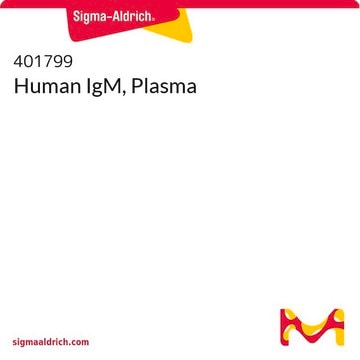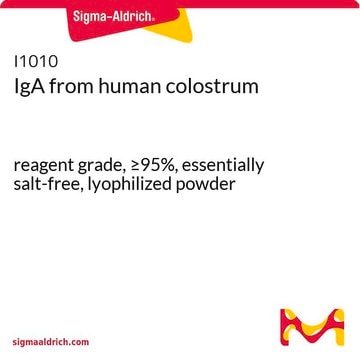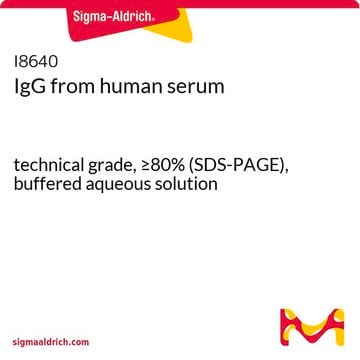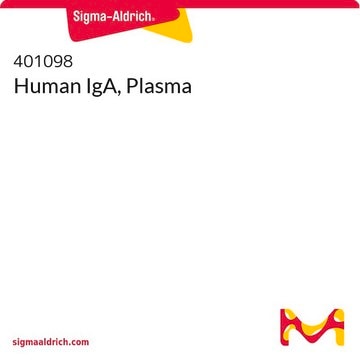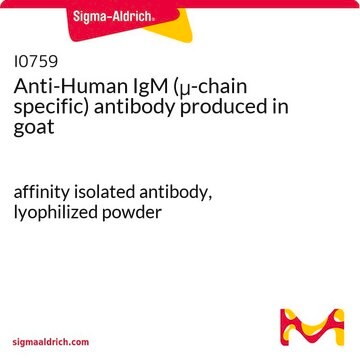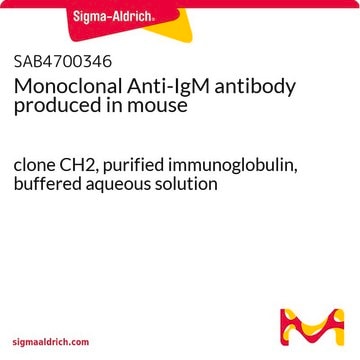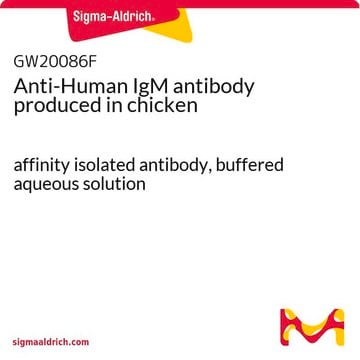I8260
IgM from human serum
reagent grade, ~95% (HPLC), buffered aqueous solution
Synonym(s):
Human IgM
Sign Into View Organizational & Contract Pricing
All Photos(1)
About This Item
Recommended Products
conjugate
unconjugated
grade
reagent grade
Assay
~95% (HPLC)
form
buffered aqueous solution
shipped in
wet ice
storage temp.
2-8°C
target post-translational modification
unmodified
General description
There are five immunoglobulin classes in humans. Out of these, immunoglobulin M (IgM) is a high molecular weight protein that has five or six subunits. IgM monomers are made of two heavy chains and two light chains connected by a disulfide bond. Human serum shows low concentration of IgM monomers. It has a high carbohydrate content of about 12%. It is the first immunoglobulin produced by neonates.
IgM antibodies are present as pentamers in the serum and are produced in response to antigens.
IgM from human serum is purified from normal human serum by precipitation and gel filtration techniques. The immunoglobulin is determined to be atleast 95% pure by HPLC procedures.
IgM antibodies are present as pentamers in the serum and are produced in response to antigens.
IgM from human serum is purified from normal human serum by precipitation and gel filtration techniques. The immunoglobulin is determined to be atleast 95% pure by HPLC procedures.
Application
Purified human IgM may be used as a reference antigen, standard, blocking agent, or coating protein in a variety of immunoassays including ELISA, dot immunobinding, Western immunoblotting, immunodiffusion, and immunoelectrophoresis. Other applications include starting materials for the preparation of immunogens and solid phase immunoadsorbents. IgM from human serum was used as standard in ELISA (100 μg/ml) and dot blot assay. Antibody concentration range of 200 μg/ml to 1 mg/ml was used in IgM binding assays.
IgM from human serum has been used
IgM from human serum has been used
- in ELISA inhibition assay
- in immunoblotting
- as MW (molecular weight) standards
- in IgM binding assay
- to confirm the depletion of immunoglobulins
Biochem/physiol Actions
Immunoglobulin M (IgM) acts as an antigen specific part of the B cell antigen receptor on the surface of B lymphocytes that are not stimulated, in its monomeric form. Polymeric IgM molecules also serve as important activators of the classical complement cascade. IgM is essential in agglutination and cytolytic reactions.
Physical form
Solution in 0.05 M Tris-HCl, 0.2 M sodium chloride, pH 8.0, containing 15 mM sodium azide.
Storage and Stability
Store at 2-8 °C. If slight turbidity occurs upon prolonged storage, clarify the solution by centrifugation before use.
Disclaimer
Unless otherwise stated in our catalog or other company documentation accompanying the product(s), our products are intended for research use only and are not to be used for any other purpose, which includes but is not limited to, unauthorized commercial uses, in vitro diagnostic uses, ex vivo or in vivo therapeutic uses or any type of consumption or application to humans or animals.
Storage Class Code
12 - Non Combustible Liquids
WGK
nwg
Flash Point(F)
Not applicable
Flash Point(C)
Not applicable
Personal Protective Equipment
dust mask type N95 (US), Eyeshields, Gloves
Certificates of Analysis (COA)
Search for Certificates of Analysis (COA) by entering the products Lot/Batch Number. Lot and Batch Numbers can be found on a product’s label following the words ‘Lot’ or ‘Batch’.
Already Own This Product?
Find documentation for the products that you have recently purchased in the Document Library.
Customers Also Viewed
Killing of dsrA mutants of Haemophilus ducreyi by normal human serum occurs via the classical complement pathway and is initiated by immunoglobulin M binding.
Abdullah M, et al.
Infection and Immunity, 73(6), 3431-3439 (2005)
H R Amini et al.
FEMS immunology and medical microbiology, 16(3-4), 163-172 (1996-12-31)
Western blot analysis (immunoblotting) of cell surface-associated proteins from Helicobacter pylori confirmed our previous findings that binding of human IgG is a common property (among H. pylori strains). Purification of the IgG-binding proteins (IGBP) was achieved by two purification steps
Localization of the domains of the Haemophilus ducreyi trimeric autotransporter DsrA involved in serum resistance and binding to the extracellular matrix proteins fibronectin and vitronectin.
Leduc I, et al.
Infection and Immunity, 77(2), 657-666 (2009)
Isabelle Leduc et al.
Infection and immunity, 77(2), 657-666 (2008-11-19)
Resisting the bactericidal activity of naturally occurring antibodies and complement of normal human serum is an important element in the evasion of innate immunity by bacteria. In the gram-negative mucosal pathogen Haemophilus ducreyi, serum resistance is mediated primarily by the
L Rydberg et al.
Xenotransplantation, 5(2), 105-110 (1998-12-16)
A quantitative ELISA technique for determination of human anti-pig xenoantibody number in serum samples has been established using pig lymphocytes and pig/rabbit erythrocytes as target cells and a pool of serum from human blood group AB donors. The number of
Our team of scientists has experience in all areas of research including Life Science, Material Science, Chemical Synthesis, Chromatography, Analytical and many others.
Contact Technical Service



